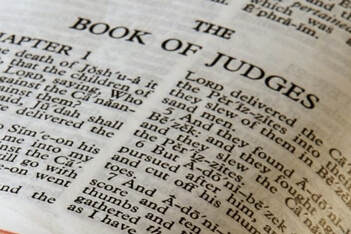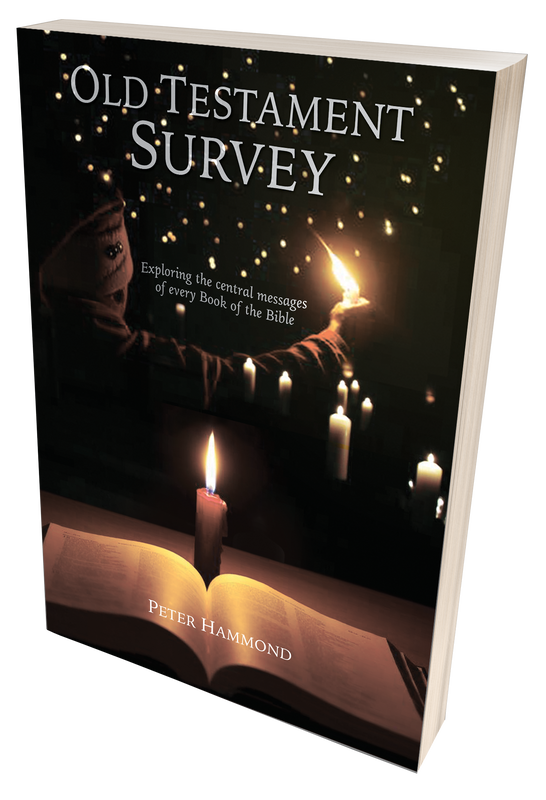
"Now these are the nations which the Lord left, that He might test Israel by them, that is, all who had not known any of the wars in Canaan. (This was only so that the generations of the children of Israel might be taught to know war, at least those who had not formerly known it)." Judges 3:1-2
The two great themes of Judges are: The Faithfulness of the Covenant keeping God and The unfaithfulness of the Covenant breaking people. Judges is a record of man's sin, God's judgement, and God's grace and deliverance. In each section we can ask: What is God's Word of promise and command? What is man's response (rebellion, or faithful obedience)? What is God's response (blessing, or judgement)? Judges show us man's potential for greatness and capacity for catastrophe. Contrasts Joshua is a book of conquest, Judges a book of defeat. Joshua is a book of Faith, Judges a book of unbelief. Joshua is a book of obedience, Judges a book of disobedience. In Joshua, God's people are united in following God. In Judges, there is division and ultimately anarchy. In Joshua, God's Word is central, in Judges, God's Word is neglected. Judges is a book of both failure and Faith.
The basic pattern that we see between Joshua and Judges, is that in Joshua there is the Creation – the conquest of the land of Canaan.
In Judges there is the fall and decline through faithlessness and disobedience. The result is God's judgement seen in oppression by foreigners. Then there is re-creation – God raises up Judges for redemption and restoration of His people. In the Book of Judges there are: seven apostasies, seven servitudes under foreign oppression and seven deliverances. Compromise with Paganism The Book of Judges begins well with the Israelites seeking guidance from God. However, one can see the beginnings of compromise, the mutilation of the Canaanite King Adoni-Bezek, whose thumbs and big toes, were cut off. Mutilation was a pagan practise. Selective Obedience Then one sees the partial selective obedience of God's people, leading to limited victory through their lack of Faith and selective obedience. From conquest in the Book of Joshua we see compromise and chastisement in Judges. "Another generation arose… who did not know the Lord, nor the work which He had done…" Judges 2:10 Deterioration One sees that God does not have grandchildren. The fervour of the first generation has become the formalism of the second generation and the apathy of the third generation. Consequences We see again and again the truth that what you sow is what you reap. There are consequences for incomplete obedience: Forced labour and servitude under foreign oppression. No Compromise God's Word had been clear, there was to be no peace treaties, inter-marriages, or religious syncretism. No peaceful coexistence with paganism. Sin leads to servitude, which leads to supplication, which leads to Salvation. Sin leads to slavery and suffering. However supplication and seeking the Lord leads to Salvation. When God's people repented, the Lord raised up for them a judge to deliver them. "So the children of Israel did evil in the sight of the Lord. They forgot the Lord their God and served the Baals and asheras. Therefore the anger of the Lord was hot against Israel and He sold them into the hand of Cushan…" Judges 3:7-8 "When the children of Israel cried out to the Lord, the Lord raised up a deliverer… who delivered them." Judges 3:9 Downward Spiral They lost fellowship with God by incomplete obedience. They did not consciously remind themselves of the grace of God. They neglected God's Word and became tolerant of the paganism that God had commanded them to destroy. God's Strategy for Complacency In Judges 3: 1-2, we see God's strategy for complacency. He turns sins into scourges that He might teach His people how to trust Him in battle. This is God's plan, that His people might be trained, purged, purified, and prepared through conflict to advance. Are you a spectator? Or a soldier? A Test The Lord left the heathen amongst them "that He might test Israel by them, to know whether they would obey the Commandments of the Lord…" Judges 3:4 Idolatry and Immorality Time and again one sees the twin curses of immorality and idolatry blighting the people of Israel and leading them away from the Lord. The Judges In the Book of Judges, we read of 11 men and 1 woman, Deborah, raised up as Judges to deliver Israel. God used different types of people. There was Othniel, a man of proven ability, superior character, spiritual depth and distinguished ancestry. There was Ehud, a prominent, courageous and capable man with a difference. There was Shamgar, a peasant from a paganised family (they named him after a pagan god). God uses men who step out in Faith, who trust Him and have the courage to take a risk, bold enough to confront the enemy. Deborah Deborah receives a large amount of space in the Book of Judges. Deborah saw a need and was determined to do something about it. She enlisted qualified help. She confronted Barak with God's command. She strengthened her general with God's promises and developed a plan. Deborah encouraged Barak with her presence. The armies of Israel were to meet the enemy at his strongest point, on the plain. Although Israel was out-manoeuvred, out-supplied and out- positioned, God intervened and sent a violent storm and flood which broke the banks of the Kishon river, that the plain was flooded and the chariots of Sisera floundered in the mud. As Sisera fled on foot to the tent of Jael, she employed Biblical body piercing by driving a tent peg through his head. (Again and again, one sees this theme of the seed of the woman crushing the serpent's head, as prophesied in Genesis 3:15.) Inactivity Condemned In the song of Deborah, she rebukes those who stayed amongst the campfires to hear the whistling of the flocks, those who had searching of heart, but whose feet did not move, those who lingered by the ships and remained on the coasts, who stayed in their coves and for various reasons failed to mobilise in the time of war. "Curse Meroz, said the Angel of the Lord, curse its inhabitants bitterly, because they did not come to the help of the Lord, to help the Lord against the mighty." Judges 5:23. "Therefore to him who knows to do good and does not do it, to him it is sin." James 4:17 Power In Weakness Time and again one sees God taking weak and apparently insignificant people and transforming them and using them. All of God's people have actually been weak people who did great things for God, because they reckoned on His strength being made perfect in their weakness. It is notable that in Judges, God delights in using what the world may look down on. There is Ehud who used a homemade dagger. There is Deborah, a remarkable woman. Gideon, the youngest from an obscure family of the smallest tribe. There is Shamgar with an oxgoad and Samson with a jawbone. Time and again one sees that God will bring deliverance by subordinates when their leaders fail to take a stand. "Not by might, nor by power, but by My Spirit says the Lord of Hosts." Zachariah 4:6 Gideon There is much attention given in Judges to Gideon. The aggressive Midianites invaded the land, looting and ruining the crops, not sparing a living thing. Like a swarm of locusts, they impoverished the Israelites until they cried out to the Lord for help. The Angel of the Lord called Gideon, who at first seemed timid and discouraged. He was commanded to go in the strength of the Lord, but Gideon protested that his clan was the weakest in Manasseh and he was the least in his own family. The will of God will never lead you where the grace of God cannot keep you. Where God guides. He provides. God's servant is God's responsibility. The safest place in the world is in the centre of God's will. Dismantling the Baal Altar Before the Midianites can be expelled, the source of their political and military power, Baal worship, must be attacked. God's altar cannot be built until Baal's altar is destroyed. The first assignment of Gideon is to destroy an altar of Baal and the place where he started was in his own back yard. Courage and Confrontation Private commitment must produce public courage and confrontation. Gideon's actions showed obedient faith in spite of his fear. Faith is not fearlessness, but obedience. Gideon openly challenged Baal and lived to tell the story, proving that Baal was powerless. When God calls us, he equips and empowers us. Every time people saw Gideon, they saw a visible proof of God's power and Baal's weakness. Gideon had destroyed the altar of Baal and lived to tell about it! Gideon's 300 Gideon then used a simple, secret and significant test to select his special group of soldiers. Most of the 32,000 who chose to serve God were rejected and sent home. They chose God, but He did not choose them. Anyone can drink water, but it is how we do the little things that matters. Gideon's 300 went out to defeat 135,000 Midianites. Defeating the Midianites Leading by example, Gideon mobilised a unity of action, using speed, skill and surprise to defeat the enemy. Encircling the Midianites, with perfect strategy and timing, with the noise of trumpets and the lights of their burning torches, they deceived the enemy into thinking there were vast companies of enemy on every side. The Midianites panicked and began killing one another. The plunderers were plundered and the invaders fled. Gideon then mobilised the nation to cut off their enemy's retreat. Samson More space in Judges is given to Samson than to any other judge. God answered the prayers of a devoted couple for a child. This child had a unique birth and was to have a unique lifestyle – he was to be a permanent Nazarite, set apart to maintain unbroken fellowship with God. He was to maintain a simple lifestyle (abstain from luxury – wine, to be different – visibly set apart by his long hair, and to not touch dead bodies, which would make him ritually unclean and symbolise a break in fellowship with God. In other words, he was to walk in constant fellowship with God. Squandered Opportunity The story of Samson (whose name means sunshine), is one of great potential wasted through lack of discipline. Like King Saul, Samson had great potential, but squandered it. Samson had God-fearing parents, a unique birth, a unique lifestyle, great personal strength and he was anointed by the Holy Spirit as a deliverer. But Samson became a weak man, because he never learned to control himself. "He who rules his spirit is better than he who captures a city." Proverbs 16:32 Downward Samson went down to Timnah. He consorted with the enemy. He refused to submit to parental authority. It was lust at first sight, ending in marriage to an unbeliever. Samson slipped into compromise and lawlessness. Too late he realised that he had lost his bet, his honour, and his wife. Too late Samson learned that if you marry an unbeliever, you have the devil for a father-in-law. Resistance However, despite his serious flaws, Samson had a passion for freedom and he recognised the threat of the Philistines. His resistance hurt the Philistines so badly that they sent a large army to deal with him. The Hebrews, however, were so backslidden and neutralised that they were ignored by the Philistines who mobilised 3,000 men to apprehend Samson. The Hebrews not only missed the opportunity to join God's freedom fighter, they co-operated with the oppressors to betray Samson into their hands! These Hebrews preferred slavery to freedom! Compromise was more comfortable to them than commitment and confrontation. They did the enemy's dirty work for them. Courage and Faith Samson acted with courage and faith, allowing himself to be tied up and walked unarmed and helpless into the vast army of screaming Philistines. This event earned him honourable mention in the Hall of Faith in Hebrews 11. As the Philistines shouted in triumph and rushed towards him the Spirit of God came upon Samson in power and he burst the ropes that tied him. He picked up the only weapon he could lay his hands on, the jawbone of a donkey, and struck down a thousand Philistines. This was followed by 20 years of peace and stability for Israel under Samson. Peace comes through strength. Stability comes through victory. Compromise and cowardice led to captivity. But the courage of Samson led to conquest. Pride Comes Before a Fall However, "pride goes before a fall" Proverbs 16:18. Samson became so self-confident and careless that he deliberately exposed himself to the enemy. Samson dishonoured his parents, distorted his purpose, defiled his purity, diluted his power, disgraced his profession and dissipated his potential. "Do not be deceived: bad company ruins good character." 1 Corinthians 15:33 Toying with Temptation Samson toyed with temptation and sought out a Philistine prostitute in the very stronghold of his enemy – Gaza. Sins may start small, but they do not end that way. The Scripture warns us to "flee sexual immorality" 1 Corinthians 6:18, but Samson chose not to flee, and he lost his character. Sin will take you further than you want to go. Sin will keep you longer than you want to stay. Sin will cost you more than you want to pay. Moral compromise makes us vulnerable. Temptation comes in attractive packages. We see the stubborn self-confidence of Samson. The seduction of Delilah and the stupidity of sin. The result was: disgrace, defeat, and disaster. The Message of Judges The story of Samson summarises the messages of Judges: Sin blinds. Sin binds. Sin grinds. Whoring leads to blindness, powerlessness, slavery, and death. An object lesson for Israel and for us. Samson went from victor to vanquished. There is a high cost to low living. "Do not be deceived: God is not mocked; for whatever a man sows, that he will also reap. For he who sows to his flesh will of the flesh reap corruption; but he who sows to the Spirit, will of the Spirit reap everlasting life." Galatians 6:7-8 But God did not give up on Samson. His discipline led to restoration. Blinded, in chains, enslaved and imprisoned, Samson returned to God in repentance. God heard his heartfelt prayer and accomplished a great victory over evil through Samson. So Samson is honourably mentioned in Hebrews 11 - the Hall of Faith. Sin does not have to have the last word in our life. Sin cannot win. Faith cannot fail. Jesus is the Eternal Judge. Dr. Peter Hammond Livingstone Fellowship P.O. Box 74 Newlands 7725 Cape Town South Africa Tel: 021-689-4480 Fax: 021-685-5884 Email: [email protected] Website: www.livingstonefellowship.co.za
0 Comments
Leave a Reply. |
OLD
TESTAMENT SURVEY ARTICLES
All
ARCHIVES |


 RSS Feed
RSS Feed